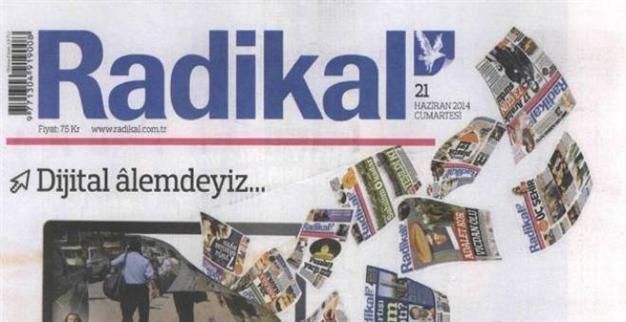BLOG: Radikal newspaper curtsies goodbye and takes leave from Turkey’s sick sector
Özgün Özçer - ISTANBUL

The very last issue of "paper Radikal" was published June 21
What an ironic date for a farewell: On June 21, at the beginning of the summer, Radikal - arguably the most important newspaper in the Turkish media landscape to overtly adopt a rights-based perspective, while still managing to remain relevant to the general public - was printed and distributed for the last time, as it heads into a digital-only format.As the summer sun was reaching its height in Turkey, journalism was painfully sliding towards its nadir, with the whole sector losing its sense of purpose: Investigating and reporting facts.
When first published in 1996 under the slogan "We are radical," the daily with the white eagle was a breath of fresh air. Over the years, it ran dozens of stories with memorable headlines that made a huge impact, became an academy for talented young journalists, and gave unprecedented coverage to topics that had not been considered news by other dailies: The environment, social issues, minority rights, LGBTs, to name just a few.
In a way, abandoning its printed edition to fully embrace this "digital era" could have been considered a final act of insurrection worthy of the "radicalism" that Radikal once claimed. But, unfortunately, it rather reflects an act of desperation to keep afloat a quality daily whose circulation plummeted to lows of a mere 20,000. Needless to say, Radikal will not be entering its new online cycle with the same human resources as before.
Now, the challenge that it faces is also common to the specific practice of Internet journalism that has developed in Turkey. Prêt-à-porter stories, mostly copy-pasted from often messy agency reports, with only a small bit of make-up added for the title, account for most of the news: A "she said this, he said that" with sloppy editing - or lack of editing - hastily put online in a race against time.
Pınar Öğünç, one of the many talented journalists at Radikal, questioned the glitzy promotion of digital media in her farewell column. “Digital media in Turkey has flourished as a channel where disregarding ethical concerns to obtain more hits can be considered acceptable, news stories that would not be chosen to be printed are ‘promoted,’ and editorial supervision has become more lax due to speed and the lack of personnel. Meanwhile, the employer shifts the blame onto the worker for not making enough profit in this new media universe, which has added new methods of exploitation to the ones that were already known in the sector ... When you dare to criticize all these things, to stand on the side of rights and labor, they are able to treat you as an ‘old-fashioned’ journalist who is not capable of seeing where the media is headed in the world. However, the direction where journalism in the world is headed is a place where original content, language and refinement - in other words, ‘production’ - become all the more valuable, as they are enriched with the possibilities offered by digital technology.”
The Turkish media suffers due to the dominant belief that newspapers are prepared thanks to marketing teams, advertisers and salespeople, who are held in the highest esteem, while reporters, editors and technical workers are considered dispensable. It suffers because investment is not made in qualified people who can create original content, but rather in mechanisms that can bring in cash.
Then there are the columnists - another phenomenon quite specific to the Turkish media: The specimen of names-attached-to-thumbnails, with self-important head shot pictures, who endlessly and tirelessly comment on daily events. For any opinion and any taste, you may find several who suit you. They are often presented as the main dish, the peak of journalistic achievement, while the rest is merely an accessory.
But the disease that the Turkish media suffers the most from is mediocrity: Reporting with unstructured and careless writing and editing that lacks quality and effort. The same agency report is posted on the website of two dozen media outlets without being processed whatsoever. Editors-in-chief disregard ethical standards under pressure to increase their number of visitors. The polemical columnist is favored over the investigative journalist. There is no such thing as a bad news story, or a useless bikini photo gallery, provided that it gets hits.
Journalism is mutating across the world but, as Öğünç describes it, it is not technology but money that determines its direction in Turkey. So there should be no wonder why Turkish journalism is so vulnerable to all kinds of political pressure and self-censorship. With the absence of an emphasis on rights and freedoms - or at least on professional standards - to set a course in troubled waters, any breeze is prone to sway the boat toward one or another political allegiance. The question now is how much longer journalists in Turkey can get away with not engaging in self-criticism and by opportunistically putting all the blame on politicians.
Regardless of the degree of its success or failure, Radikal was precisely the hallmark of a newspaper that transcended the individuals who were part of it. It deliberately tried to adopt an approach promoting individual rights, fighting against discrimination, and giving more visibility to oppressed and disadvantaged groups. It was the first large-audience media outlet that fully embraced the Gezi protests and scrupulously reported about the victims of police violence.
More than the “digital” medium per se, it will be the conditions that Radikal will have to endure to continue surviving that will threaten its specificity. It is now up to the directors to choose whether or not to shelter behind the excuse of “the death of print” to justify the lack of original content, or perhaps the time has come to take the trouble to make bold decisions. In the meantime, colleagues are hanging on.
















